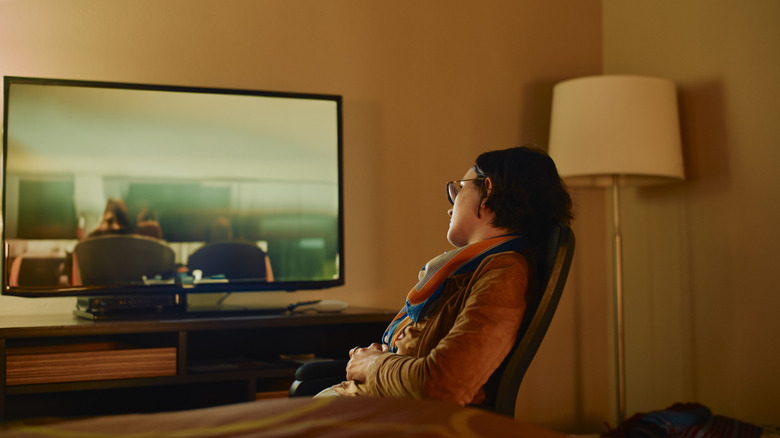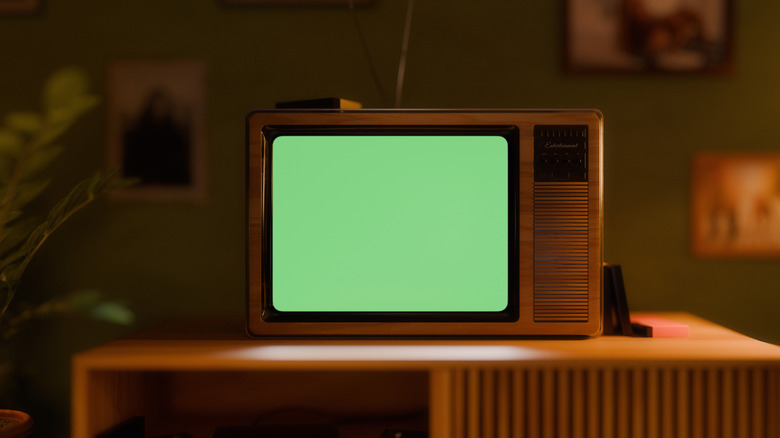Why You Should Avoid Leaving The TV On In Your Hotel Room When You Go To Sleep
It wasn't that long ago that many high-functioning, career-driven people seemed to view sleep as a necessary evil, a block of time in which they were prevented from getting things done. When, in 2017, Netflix's CEO Reed Hastings openly admitted that sleep was his streaming service's biggest competitor, it showed how little society had come to value the body's nightly reset period. But we are now in the throes of a sleep revolution. Books like Arianna Huffington's "The Sleep Revolution" and Mark Stephens's "Yoga for Better Sleep" are permanent fixtures on bookstore shelves. New sleep apps are constantly in development, sleep hacks for long-haul flights are all the rage, and travelers are even structuring their vacations around rest.
If jetlag and first-time-parent delirium didn't make it patently obvious already, people are now realizing that sleep is vital. According to the United States National Heart, Lung, and Blood Institute, sleep is a major facilitator of health and well-being. Good sleep improves brain function, metabolic rate, cardiovascular health, and immune system efficiency. It even affects hunger levels and your response to stress. Seven to nine hours is the recommended nightly amount for adults, though children will generally require a lot more, the exact amount depending on their age.
The quality of your sleep is as important as the quantity. And this is why you should avoid behaviors like leaving the TV on while you sleep, especially in a hotel room. The human brain and body like routine and predictability, so your sleep will already be hindered by the introduction of a new bed. The National Institutes of Health describe this as the "first-night effect," whereby sleeping in an unfamiliar environment causes reduced sleep quality, changes to sleep architecture, and less time spent in deep sleep.
Sleeping with the TV on in practice
Deep sleep occurs during the third stage of the non-rapid eye movement (NREM) phase of the sleep cycle. Called slow-wave sleep (SWS), this is when your brain waves, breathing, and heartbeat are at their most relaxed. It is a healing stage of sleep, sharpening your memory and overall brain functionality, and encouraging the repair of organs, muscles, and tissues. Simply put: you don't want to disturb SWS.
A combination of blackout curtains, soft bedding, temperature control, and sound insulation is sometimes used to ensure you sleep better in a hotel. But turning on the TV undoes the good work. It keeps a sleeping brain active, the lights and sounds sending signals to tune it to high alert. This can impinge upon deep sleep, spiking your anxiety levels and hindering your focus and recall abilities. The brain interprets this excess blue light as an indicator that it's daytime, delaying the release of the sleep-inducing hormone melatonin. This can affect your circadian rhythm, making it harder to both fall and stay asleep.
Many consider flicking on the TV as part of their nightly routine, a stream of background chatter that helps keep negative or anxious thoughts at bay. Experts acknowledge this makes it difficult for some travelers to go cold turkey, so to speak, and sleep in a dark and silent hotel room. Clinical psychologist Sumi Raghavan accepts that sleep and anxiety are connected. "I would also ask if there's anything about sleeping with television that's not working for you," she told Sleep.com. "Let's get in touch with the motivation to change this habit. Are you finding you end up staying up later, or don't sleep as well? First, understand the origins and purpose of the habit, then channel the motivation to change."

